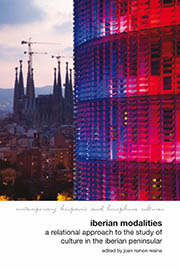Book contents
- Frontmatter
- Contents
- Preface
- List of Contributors
- Introduction: Iberian Modalities: The Logic of an Intercultural Field
- Part I Institutionalizing Iberian Studies: A Change of Paradigm
- Part II Theorizing Iberia
- 5 Iberia Reborn: Portugal through the Lens of Catalan and Galician Nationalism (1850–1950)
- 6 Francisco María Tubino: Between Federalism and Iberianism
- 7 Translation and Conversion as Interconnected “Modes”: A Multidisciplinary Approach to the Study of Ethnicity and Nationalism in Iberian Cultures
- Part III Iberian Dialogs
- Part IV From Sea to Iberian Sea
- Works Cited
- Index
7 - Translation and Conversion as Interconnected “Modes”: A Multidisciplinary Approach to the Study of Ethnicity and Nationalism in Iberian Cultures
from Part II - Theorizing Iberia
- Frontmatter
- Contents
- Preface
- List of Contributors
- Introduction: Iberian Modalities: The Logic of an Intercultural Field
- Part I Institutionalizing Iberian Studies: A Change of Paradigm
- Part II Theorizing Iberia
- 5 Iberia Reborn: Portugal through the Lens of Catalan and Galician Nationalism (1850–1950)
- 6 Francisco María Tubino: Between Federalism and Iberianism
- 7 Translation and Conversion as Interconnected “Modes”: A Multidisciplinary Approach to the Study of Ethnicity and Nationalism in Iberian Cultures
- Part III Iberian Dialogs
- Part IV From Sea to Iberian Sea
- Works Cited
- Index
Summary
In previous work my main concern has been to “translate” the insights of Americo Castro about identity formation in the Iberian peninsula into a conceptual framework of ethnicity studies. Contrary to the many critiques of Americo Castro's work – mostly on the part of historians – I advocated an anthropological reading of it. Drawing on the work of Fredrik Barth, Anthony D. Smith, and John Armstrong, I studied historical and contemporary processes of ethnogenesis and ethnicity in Spain. The central concept of my analysis was casticismo, viz. the ethnic identification with Christianity as opposed to Islam and Judaism (Stallaert, Etnogénesis; Perpetuum; Ni una gota).
In this essay, I propose to go a step further and show how casticismo, as the central myth-symbol complex of ethnicity in the Iberian peninsula, can be linked to translation studies. This does not mean that I am abandoning anthropology as a frame of research or that I think that, as far as ethnicity is concerned, we are in need of paradigm renewal. Rather, I will try to show the mutual benefits of a multidisciplinary approach for both anthropology and translation studies, particularly at the start of the third millennium, characterized by the blurring of disciplinary boundaries. I will focus on the intersection of anthropology and translation from the point of view of ethnogenesis. The case of Iberian collective identities is particularly interesting because of the centrality of religious conversion in the successive negotiations of ethnic boundaries in the course of history.
- Type
- Chapter
- Information
- Iberian ModalitiesA Relational Approach to the Study of Culture in the Iberian Peninsula, pp. 109 - 126Publisher: Liverpool University PressPrint publication year: 2013

